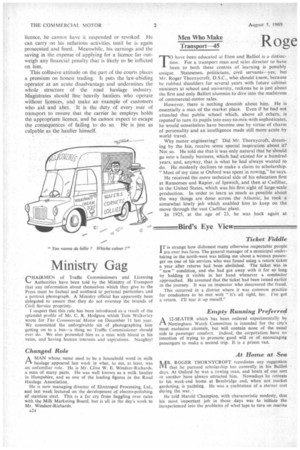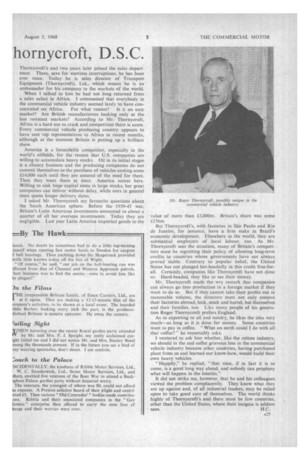Men Who Make Transport-45
Page 26

Page 27

If you've noticed an error in this article please click here to report it so we can fix it.
Roge hornycroft, D.S.C.
TO have been educated at Eton and Balliol is a distinction. For a transport man and sales director to have been to both these centres of learning is possibly unique. Statesmen, politicians, civil servants—yes; but Mr. Roger Thornycroft. D.S.C., who should know, because he rubbed shoulders for several years with future cabinet ministers at school and university, reckons he is just about the first and only Balliol alumnus to dive into the mtelstrom of commercial-motor sales.
However, there is nothing donnish about him. He is essentially a man of the market place. Even if he had not attended that public school which, above all others, is reputed'to turn its pupils into easy-to-mix-with sophisticates, he would nonetheless have become one by virtue of charm of personality and an intelligence made still more acute by world travel.
Why motor engineering? Did Mr. Thornycroft, dreaming by the Isis, receive some special inspiration about it? Not so. He told me that it was only natural that he should go into a family business, which had existed for a hundred years, and, anyway, that is what he had always wanted to do. He modestly declines to make a claim to scholarship. "Most of my time at Oxford was spent in rowing," he says.
He received the more technical side of his education first at Ransomes and Rapier, of Ipswich, and then at Cadillac, in the United States, which was his first sight of large-scale production. In order to learn as much as possible about the way things are done across the Atlantic, he took a somewhat lowly job which enabled him to keep on the move through the vast Cadillac plant.
In 1925, at the age of 23, he was back again at Thornycroft's and two years later joined the sales department. There, save for wartime interruptions, he has been ever since. Today he is sales director of Transport Equipment (Thornycroft), Ltd., which means he is an ambassador for his company in the markets of the world.
When I talked to him he had not long returned from a sales safari in Africa. I commented that everybody in the commercial vehicle industry seemed lately to have con centrated on Africa. For what reason? Is it an easy market? Are British manufacturers looking only at the less resistant markets? According to Mr. Thornycroft, Africa is a hard nut to crack and competition there is acute. Every commercial vehicle producing country appears to have sent top representatives to Africa in recent months, although at the moment Britain is putting up a brilliant show.
America is a formidable competitor, especially in the world's oilfields, for the reason that U.S. companies are willing to accumulate heavy stocks. Oil in its initial stages is a chancy business and the producing companies do not commit themselves to the purchase of vehicles costing some £14,000 each until they are assured of the need for them. Then they want them at once. America scores here. Willing to sink huge capital sums in large stocks, her great companies can deliver without delay, while ours in general must quote longer delivery dates.
I asked Mr. Thornycroft my favourite questions about the South American sphere. Before the 1939-45 war, Britain's Latin American investments amounted to about a quarter of all her overseas investments. Today they are negligible. Last year Latin America imported goods to the value of more than £3,000m. Britain's share was some £156m.
But Thornycroft's, with factories in Sao Paulo and Rio de Janeiro, for instance, have a firm stake in Brazil's economic development. Elsewhere in the world, they are substantial employers of local labour, too. As Mr. Thornycroft sees the situation, many of Britain's competitors must be regretting their policy of allowing long-term credits to countries whose governments have not always proved stable. Contrary to popular belief, the United States has not plunged hot-headedly in this credit free-forall. Certainly, companies like Thornycroft have not done so. Hard-headed, they like to see their money.
Mr. Thornycroft made the wry remark that companies can always go into production in a foreign market if they want to do so. But if they cannot take their profits out in reasonable volume, the directors must not only remove their factories abroad, lock, stock and barrel, but themselves and their families, too. Like many people of his generation Roger Thornycroft prefers England.
As to exporting to all and sundry, he likes the idea very much—as long as it is done for money. Some countries want to pay in coffee. "What on earth could I do with all that coffee?" he reasonably asks.
I ventured to ask him whether, like the cotton industry, we should in the end suffer grievous loss in the commercial vehicle industry because other countries, having purchased plant from us and learned our know-how, would build their own heavy vehicles.
"Happily," he replied, "that time, if in fact it is to come, is a good long way ahead, and nobody can prophesy what will happen in the interim."
It did not strike me, however, that he and his colleagues viewed the problem complacently. They know what they are up against and, of all industrial leaders, may be relied upon to take good care of themselves. The world thinks highly of Thornycroft's and there must be few countries, other than the United States, where their insignia is seldom seen. H.C.




































































































